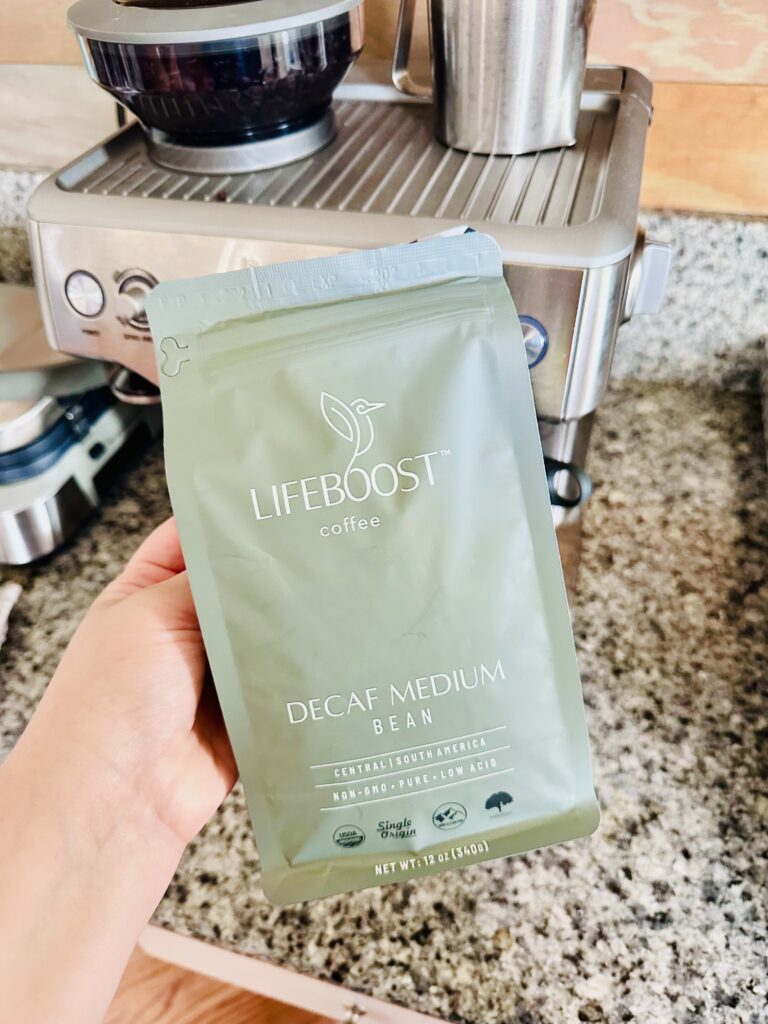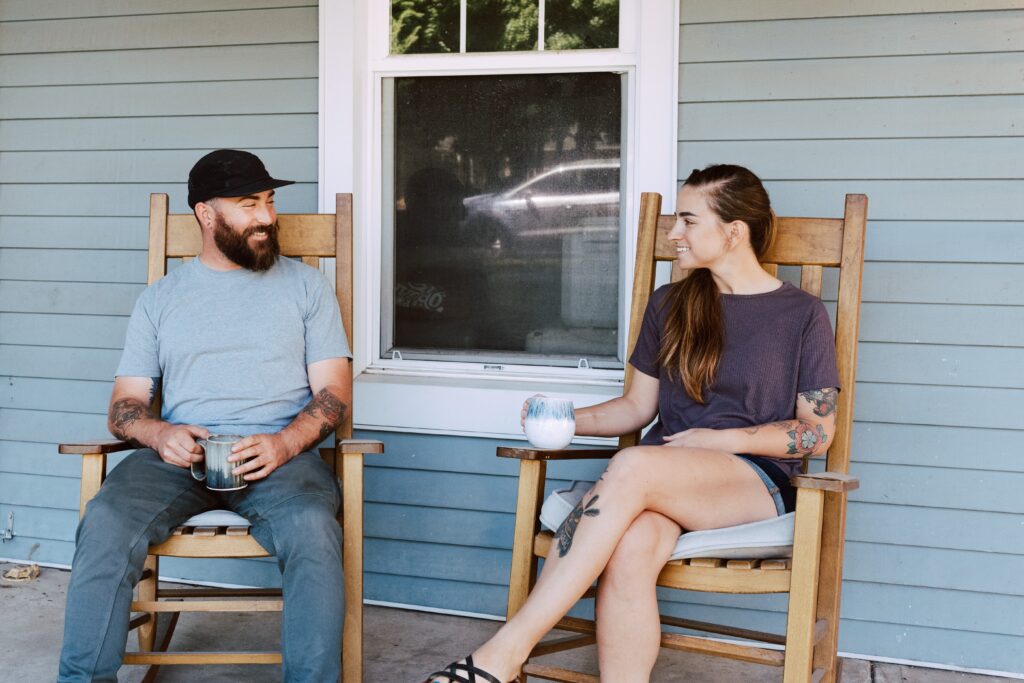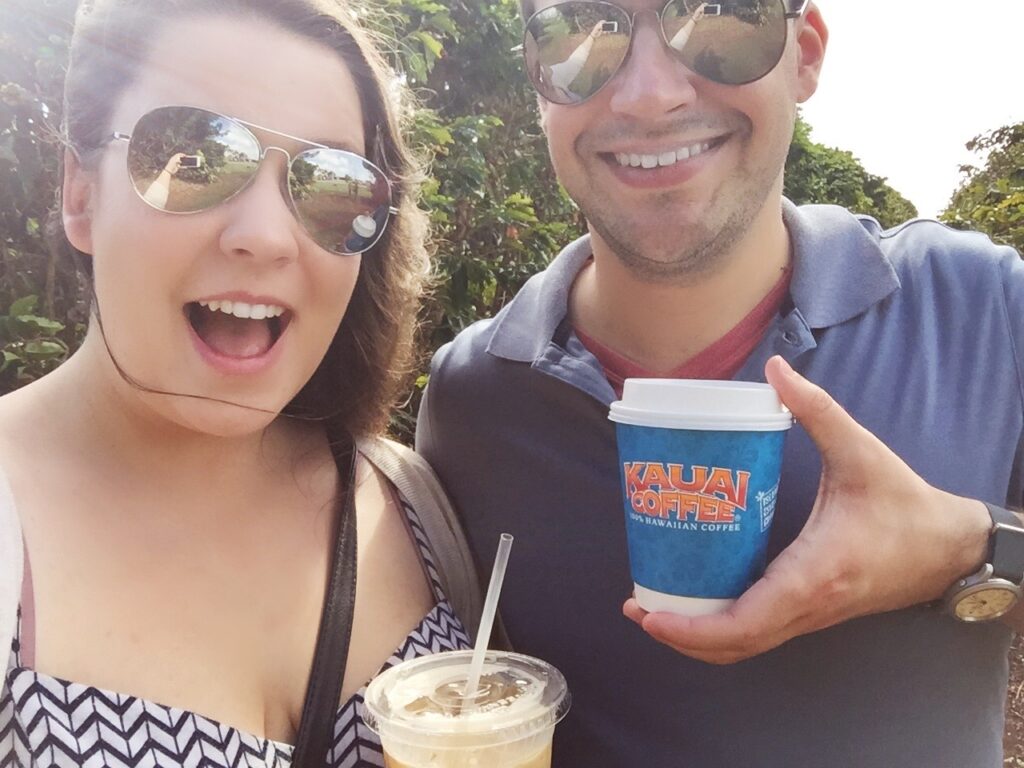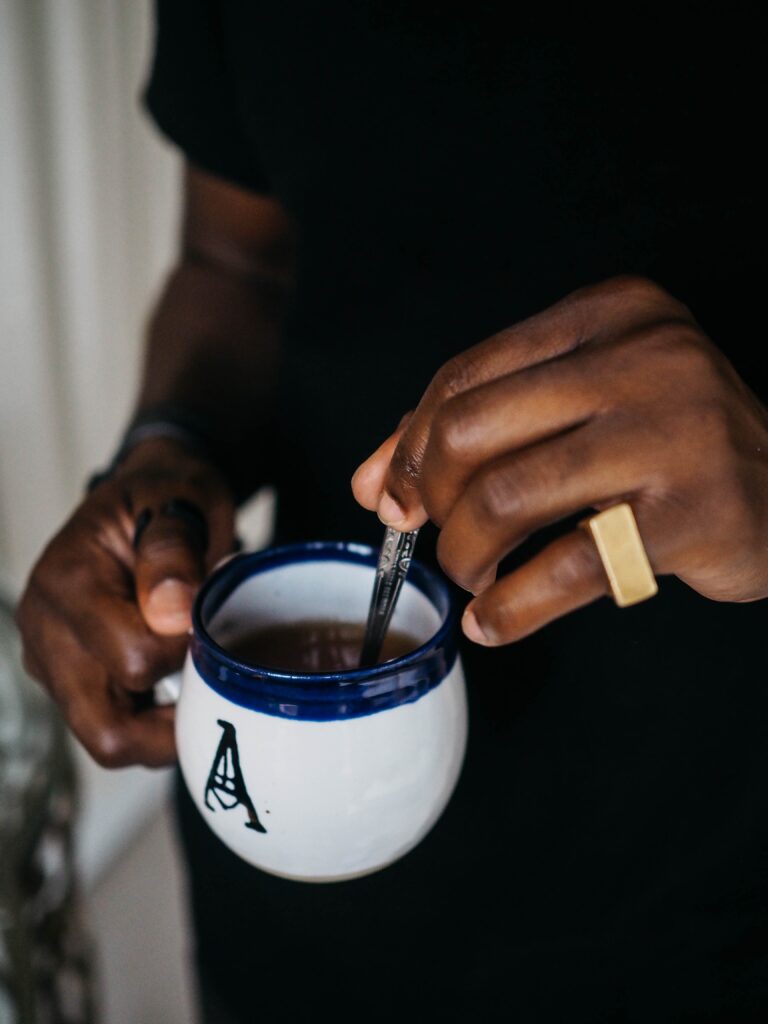Are you on a years-long quest to find the best decaf organic coffee brands? Maybe, you are ready to kiss caffeine jolt and occasional unpleasant anxious tizzy goodbye due to health reasons. Don’t fret. We’ve got you!
We went on a scavenger hunt for top-rated USDA and fair trade certified, organic decaf coffee options approved by picky joe-sippers and passionate fair trade coffee consumers alike.
You probably already know that coffee is often grown in environmentally sensitive places. That’s why it’s important to support brands that thrive on working with farmers who use organic growing techniques that are kind to the environment and all its inhabitants.
Aside from choosing coffee beans grown at higher altitudes due to their quality, we also took into consideration the swiss water process method for decaf coffee.
The best decaf organic coffee brands use a patented decaffeination method that uses only water (and zero chemicals) to remove 99.9% of a coffee’s caffeine content. Yes, clean water is the only added ingredient.
Ahead, discover your new go-to decaf coffee fix.
This post may contain commissionable links. Thank you for supporting this resource.

Best Decaf Organic Coffee Brands For Healthy Brews
1. Purity Coffee *TOP PICK*
“CALM” is Purity Coffee’s original medium roast specialty-grade organic whole beans coffee.
The brand uses a chemical-free natural water process called ‘the Swiss water method’ to remove 99.9% of caffeine all while retaining its high antioxidant and anti-inflammatory properties.
Plus, this 100% specialty-grade organic Arabica coffee is USDA Organic Certified, as well as Rainforest Alliance Certified.
This means that products are grown and processed according to standards addressing soil and water quality, among other factors. It has a full body flavor that won’t even have you missing regular coffee!
On top of that, the brand’s best organic decaf coffee is 3rd party tested for mold, mycotoxins, and pesticides, and comes in several varieties of roasts.
2. Thrive Market Coffee
As most artisan blends from the Thrive market, this 100% Certified organic coffee has a first-rate flavor profile, whether you’re looking to ease into your morning, or have a quick afternoon pick-me-up.
The brand ethically sources only the highest quality arabica beans directly from coffee farms in Peru, and then roast them in small batches to ensure maximum flavor and the maintenance of all health benefits.

This is because Thrive Market has championed the Swiss Water Process of decaffeination, which is chemical-free and removes 99.9% of the caffeine from the beans.
Much like most of our favorite organic, decaffeinated coffee brands, this one offers membership perks–aka a great discount for your whole bean coffee.
3. Four Sigmatic Chill
This swiss water decaf ground coffee is loaded with antioxidants!
It’s specifically made for coffee lovers who prefer smooth tastes and great flavor as well as some additional health benefits.
More precisely, these decaf beans are infused with two mushroom extracts known for helping drinkers chill and relax.
Reishi mushrooms can potential reduce stress levels. As for, the Chaga mushroom extract, it can support the immune system by helping to reduce inflammation and lower blood sugar.
4. LifeBoost Decaf
LifeBoost offers the best organic low acid coffee, ethically-sourced and decaffeinated via swiss water processing. The hand-selected and hand-washed beans are farmed in the high-elevation ground and left to dry in the sunlight.
On top of that, this small business’ single-origin non-GMO medium-ground coffee is third party tested for Mycotoxins and Pesticides on top of being USDA-certified.

In fact, the brand is so certain about its quality and taste, that they offer you 30 days to try out a bag and if it doesn’t live up to the hype, then they’ll gladly take it back and issue a refund.

5. No Fun Jo Decaf Coffee
Lauded as one of the best decaf organic coffee brands of 2023, Jo Coffee offers blends with complex notes of blueberry and milk chocolate, with no flavors added!
The freshly roasted, specialty-grade coffee, is hand-crafted, by artisan roasters, in the brand’s own micro-roastery.
It’s also fair trade, which means that the decaf blend has been audited throughout the supply chain to meet certain sustainability and labor standards. Additionally, thanks to swiss water processing, the, smooth, rich, non-bitter organic coffee blend managed to preserve the taste and characteristics.
6. Fabula Decaf Coffee
Fabula definitely deserves a spot among the best decaf organic coffee brands.
Their delicious coffee is always Certified Organic, low-acid, non-GMO, and freshly roasted right before arriving at your doorstep.
The company uses the oh-too-familiar chemical-free Swiss water decaffeination process to remove 99.9% of the caffeine from the single-origin coffee beans.
To top it all off, this fair trade medium decaf blend is also guaranteed mold-free.
7. Buzz Free Decaf by 365
If you are a serial organic decaf coffee drinker on a budget, Buzz Free Decaf by 365 is for you! The medium roast Swiss water process decaf coffee is made using premium quality, low-acid Arabica beans.
It’s a USDA-certified ground coffee sourced from top-quality fair Trade producers who prioritize sustainable growing practices. Great coffee at an even greater price, what more can we ask for?
8. Kion Decaf Coffee
Kion’s decaf options are all certified organic, grown in a manner that supports your health and the planet’s.
This one is a medium roast, specialty grade blend which basically means that it’s the highest quality coffee available with near zero defects.
Plus, the brand focuses on sourcing coffee beans from farms that meet the highest standards for ethical and sustainable farming practices.
What’s more, the decaf coffee beans are rigorously tested for pesticides, yeast, mold, and mycotoxins.
And there’s even more! This delicious coffee is expertly roasted using an environmentally-friendly smokeless roaster, and sealed in nitrogen-flushed bags to maintain freshness.

9. Kicking Horse
If you are constantly on a hunt for the best decaf organic coffee brands that are up and ready to ship dark roast coffee with a rich, chocolatey finish straight to your doorstep, look no further than Kicking Horse.
Whether you prefer having a French Press, a pour-over, or cold brew, this USDA Organic and fair trade whole bean coffee will tick all your quality and flavor boxes.
To top it all off, you can rest assured knowing that your cup of coffee was decaffeinated with the help of the swiss water® process and thus, it still has the coffee’s original characteristics –minus the caffeine, of course.
10. Natural Force – TOP PICK
Natural Force is one of the most raved-about decaf organic coffee brands that have been tested and independently analyzed for the presence of mold, mycotoxins (ochratoxin A, aflatoxin), acrylamide, heavy metals, gluten, and more.
Their commitment to having the best decaf coffee beans is a real thing that makes them one of the best options.
99% of the whole bean coffee’s caffeine was removed via the Swiss water decaffeination process which is solvent and chemical-free –the perfect choice for health-conscious decaf coffee drinkers.
Certified USDA Organic, Keto, Paleo, and vegan, this medium roast is equal parts healthy and delicious.

Why should we drink organic coffee?
Coffee is one of the most popular drinks in the world, and for good reason. It’s rich flavor and aroma can provide a much-needed pick-me-up during tired moments.
However, many java drinkers don’t realize that their beloved beverage can also be packed with health benefits – as long as it’s organic.
Here’s a quick rundown on why organic coffee is the way to go. Assuming you love coffee as much as we do, here are reasons why you should make the switch to organic beans:
1) Eliminate pesticides and herbicides: Non-organic coffees are often sprayed with harmful chemicals like pesticides and herbicides. These chemicals can end up in your cup of joe, leaving you exposed to their potential health risks.
2) Higher quality bean: In order for coffee to be certified organic, farmers must adhere to strict guidelines set by the USDA. This includes using sustainable farming practices that help preserve the quality of the beans. As a result, you’ll get a tastier, more flavorful cup of coffee.
3) Support farmers: When you buy organic coffee, you’re supporting farmers who are using environmentally-friendly growing methods. You’re also helping to create fair working conditions and wages for farm workers around the world.
4) Improve the environment: Organic farming practices help promote biodiversity and protect natural resources like water and soil. By drinking organic coffee, you can play a part in preserving our planet for future generations.
5) Get peace of mind: Knowing that your coffee is grown without harmful chemicals can give you a sense of comfort and peace of mind – something we could all use a little more of these days! Make the switch to organic today and enjoy your cup of java worry-free!
But we have to keep in mind too that just because a coffee is labelled organic doesn’t mean it is free of mold or mycotoxins. You also need to look for brands that are third-party tested to be free of these things as well.

The Benefits of Organic Coffee
Coffee lovers now have the option of drinking organic coffee, which is grown naturally and without any pesticides or other additives.
Organic coffee has a more distinct flavor than regular coffee, and its mild taste can usually be enjoyed without cream or sugar.
Not only does organic coffee offer an enjoyable drinking experience, but it also carries with it some health benefits.
Because it’s natural, organic coffee offers plenty of antioxidants that help protect the body from potential illnesses.
Furthermore, organic coffee does not contain artificial fertilizers that can be harmful to the environment, making it a sustainable choice for eco-conscious caffeine consumers. Who knew a cup of joe could have such positive effects?
How To Know If Your Coffee Is Organic
There’s nothing quite like starting the day with a good cup of coffee–especially if your beans are organic. Knowing if you’re really getting organic beans, however, can be a bit tricky.
A great indicator that your coffee is organic is examining the label carefully.
Organic certification labels should be featured prominently on all organic products, including coffee beans and grounds. If there isn’t a certification label or logo present on the packaging, you can also look for statements such as “Organically grown” or other terms that indicate it was sustainably sourced from an ecological farm.
With a few simple steps, you’ll be able to find out whether or not your morning cup of joe is truly part of an ethical and sustainable source.
The Best Ways to Enjoy Organic Coffee
For those looking to truly savor the flavor of organic coffee, there are a few enjoyable ways to do so.
One option is to brew your own coffee, selecting an organic blend that fits your taste buds and experimenting with different brewing techniques.
Alternatively, you can seek out local cafés or specialty stores that offer organic coffee varieties and create a relaxing ritual of enjoying your cup, complete with adding milk or sugar if desired.
And for an outdoorsy experience with an organic twist, look up farm-to-cup roasters that let you pick beans right out of the fields and roast them yourself – making the ultimate cup of coffee.
No matter what method you choose, it’s sure to be an enriching experience to be able to savor organic coffee in its truest form.

The Importance of Supporting Organic Farmers
Supporting organic farmers is essential to the health of our environment and communities.
Organic farmers are dedicated to sustainable growing practices that preserve natural resources, reduce pollution, increase soil health, and benefit local wildlife.
These efforts have an even greater impact when there’s more demand for their products and communities become more aware of the positive impacts organic farming has on the world around us.
By shopping locally and supporting organic farmers in our area, we can help reduce our carbon footprint while also enjoying access to fresher, seasonal food that supports our local economy.
In addition, when we support organic farmers, we not only ensure healthier food choices for ourselves; we’re making a powerful statement about what kind of future we want for generations to come.
Why Buying Organic Coffee Is Worth the Investment
Coffee is one of the most popular drinks in the world and it comes with huge health benefits. So if you want to make sure you’re getting the best cup of joe, purchasing organic coffee is a smart choice.
Organic coffee beans are grown without using any artificial chemicals. This means they avoid potential health risks from exposure to these ingredients.
Plus, organic coffee is known for its great flavor — often described as more subtle and sweet compared to non-organic brands.
Buying organic helps support farmers who are committed to sustainable practices and protects our planet while giving us a cup of delicious coffee! It may cost a bit more than conventional coffee, but if you care about what you put in your body and where it comes from, there’s no question that organic is worth the investment.
In Summary: Best Decaf Organic Coffee
So, now that you know all about organic coffee and why it’s so great, go out and enjoy a cup! Make sure to check the label to ensure your coffee is truly organic. And while you’re looking at the label, look for third party test results to ensure your coffee is mold and mycotoxin free.
When possible, support organic farmers by purchasing their beans directly. And don’t forget, while organic coffee may cost a little more upfront, it’s worth the investment for both your health and the planet. Enjoy!
